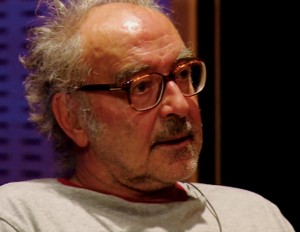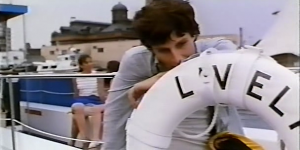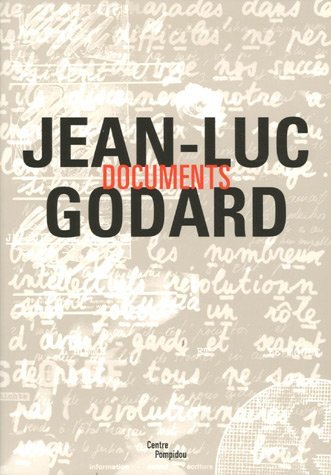One of my “En movimiento”columns for Cahiers du Cinéma España, written specifically for their special Godard issue (December 2010). — J.R.
Writing recently here about the largely negative American reception of Film Socialisme at Cannes, I noted — in response to the implications of such critics as Todd McCarthy and Roger Ebert that the film’s difficulties could somehow be attributed to flaws in Godard’s character — that I was “impressed not only by the film’s singular, daring, and often beautiful employments of sound and image, but also by its tenderness towards virtually all the contemporary characters and figures in the film (including the animals) — a virtue I don’t find at all present in For Ever Mozart.”
One could, in fact, go through many portions of Godard’s filmography and cite works that are humanist (such as Bande à part, Masculin-Féminin, and France/tour/detour/deux enfants) and those that are relatively nonhumanist (such as Weekend, Vladimir et Rosa, and Passion). Even though one could argue that Godard’s self-imposed social isolation since his departure from Paris has had harmful effects on his art, it is too simplistic to assume that he’s always or invariably the simple grouch that many journalists have claimed him to be.
I can amplify my defense of Godard’s generosity to others (at least on some occasions) by citing his kindness towards two Americans in 1996, around the same time he was appearing with For Ever Mozart (for me, still one of his weakest films) — namely the writer-director-cinematographer Rob Tregenza and myself.
I first became aware of Tregenza in 1988, when his first feature, Talking to Strangers — a 35-millimeter feature of nine ten-minute takes, each one shot only once — showed at the Toronto film festival. After I wrote a lengthy review of the film when it played in Chicago less than two months later, we became friends, and more recently Tregenza, now head of the film department at Virginia Commnwealth University, was responsible for my getting hired there to teach film for two semesters.
In 1996, Godard selected Talking to Strangers (along with Norman McLaren’s Blinkity Blank) to show in the Toronto festival’s series “Talking with Pictures,” and on this occasion he published what may qualify as his last film review to date. In it he calls Talking to Strangers a “wonderful, half-successful film,” recalling that he once praised Jacques Becker’s Montparnasse 19 “precisely for its failures”. (Eleven years later, Tregenza presented this feature at the Centre de Cultura Contemporània de Barcelona, along with a documentary about its making, Tregenza and Company, which premiered on that occasion.) After the poor reception of Tregenza’s second feature, The Arc, in 1991, the possibility of him making a third feature seemed remote until five years later, in Toronto, when Godard offered to produce it. The results of this collaboration, Inside/Out, which premiered at Cannes in 1997, remains, to the best of my knowledge, the only American feature ever produced by Godard, although he kept his name off the credits, probably to avoid other filmmakers besieging him with scripts. (Faxes from Godard pertaining to this collaboration can be accessed in Jean-Luc Godard: Documents, a huge compendium put together by Nicole Brenez in collaboration with Michael Witt and published by the Centre Pompidou in 2006; it can also be found on my web site at www.jonathanrosenbaum.net/2008/08/five-letters-from-godard-apropos-of-insideout/.)
In 1996, at the same edition of he Toronto film festival where Godard embarked on this adventure, he showed me the three most recent chapters of his Histoire(s) du cinéma (3a, 3b, and 4a) in his hotel room, leading to an extended conversation with him that was eventually published in the French magazine Trafic, and just before this dialogue, he praised my work quite extravagantly in his press conference, comparing me to both James Agee and André Bazin. When I tried to express my appreciation for this gesture to him just afterwards, he said, “I hope it will help you more than hurt you, considering whom it’s coming from.”
P.S. (October 19, 2015): I recently got word that Tregenza was shooting his fourth feature in Norway.





